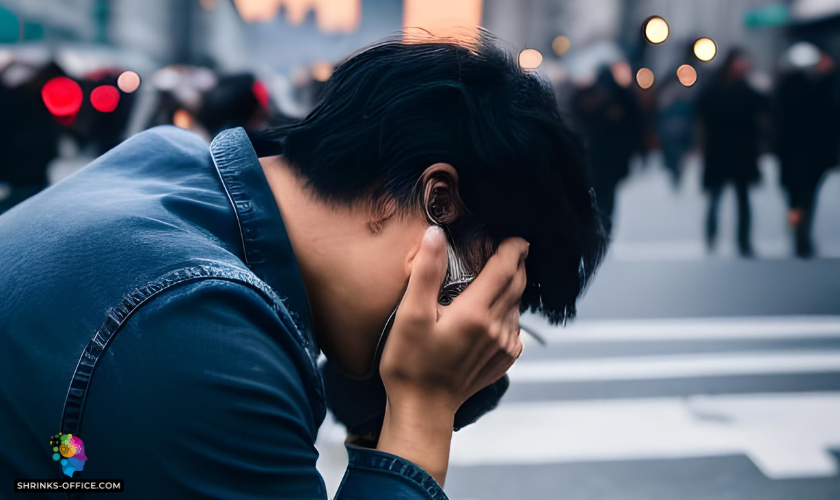In today's fast-paced world, finding moments of mindfulness can be a challenge. Embracing "The Power of Now"...

Self-harm can be a coping mechanism for intense emotions, including anger. It may provide a temporary sense of relief or control, but ultimately can lead to more harm and negative consequences. It's important to explore the root causes of your anger and develop healthier coping strategies.
- Pay attention to what situations or emotions lead to the urge to hit yourselfu003cbru003e- Find healthier ways to manage your angeru003cbru003e- Consider reaching out to a u003ca href=u0022https://onlinetherapy.go2cloud.org/SH9uu0022 target=u0022_blanku0022 rel=u0022noopeneru0022 title=u0022u0022u003etherapistu003c/au003e or support groupu003cbru003e- If certain situations or people trigger your anger, consider limiting your exposure to themu003cbru003e- Be kind and patient with yourself as you work to overcome these behaviors
u003cimg class=u0022wp-image-885u0022 style=u0022width: 150px;u0022 src=u0022http://shrinks-office.com/wp-content/uploads/2023/03/Heal-from-self-harm.pngu0022 alt=u0022u0022u003eu003cbru003eu003ca href=u0022https://amzn.to/3Kj8hfTu0022 target=u0022_blanku0022 rel=u0022noopeneru0022 title=u0022u0022u003eHealing From Self Harm: A Journal For Self Harmers with Positivity Guided Promptsu003c/au003e
Feeling extreme emotions like anger and having negative feelings can be difficult to manage, and it can sometimes lead to outbursts of physical aggression. A person may hurt themselves in order to release the built-up tension, overwhelming emotions, and anger. This is called self-harm and can be done in various ways, such as by punching, slapping, or even headbanging.
Self-harm is an act usually seen as an expression of frustration and helplessness, but it can also be a sign of an underlying personality disorder or mental health problems, such as depression or anxiety disorders. It is important to understand why this behavior occurs so that appropriate help can be sought if necessary as it can lead to serious physical injury [1]
Understanding the reason behind the question "why do i hit myself when I'm angry?" can often be a challenging conundrum. The act of self-harm, which may involve behaviors such as cutting or burning oneself to feel physical pain, can seem unfathomable to some. Yet, it's a complex issue with a myriad of potential causes, each of which warrants careful exploration.
Self-injury often serves as a coping mechanism for individuals grappling with overwhelming emotions, persistent troubling thoughts, or high-stress situations. It's a distressing strategy employed by those who, in their intense emotional state, may feel helpless or cornered. [2]
Personality disorders can also contribute to the propensity for self-harm, making it even more complicated to understand and address. However, regardless of the underlying reasons or the emotional relief it may provide temporarily, self-injury invariably leads to both physical and emotional pain.
Moreover, individuals who struggle with articulating their emotions may resort to self-harm as an unconventional and harmful means of expression. At times, these self-harming actions might also be carried out as a form of self-punishment for perceived wrongs.
Here are 4 reasons why people intentionally hurt themselves when they are angry:
Self-injury is employed by people who struggle to maintain emotional and mental stability. Achieving such stability requires diverting your attention from a more pressing issue to one that is less urgent. Self-inflicted physical pain, such as cutting or burning your body, is a very intense and potent sensation. [2]
Some people who self-injure do so in order to drown out the tormenting thoughts that occupy their heads. They might, for instance, be suffering from PTSD after experiencing trauma as a result of physical or sexual abuse, mental illness problems, overwhelming feelings, substance abuse use, etc. Their minds might be stuck in a loop where the assault keeps playing out in their minds.
They hope to find temporary comfort from the stress of self-injury by focusing their attention on the pain of the wound.
Some people's ability to regulate their impulses is severely compromised by mental health issues or brain traumas. Because they lack the protective buffer that instructs them not to hurt themselves, they could resort to hitting themselves. It's possible that the person's mind will convince them that harming themselves is the best way to cope with whatever is making them angry. [3]
When you're angry or frustrated, you may be dumbfounded and unable to express your emotions through speech or writing. This may force you to hit and harm yourself, hoping this action would make your provoker or sympathizer understand your feelings. [4]
You can take this quick depression test to know if you're depressed and start dealing with the condition accordingly.
Sometimes, you may be the source of your anger. You may be disappointed with yourself for your failed dreams, constant struggles in life, and misfortune. This self-directed anger may cause you to hit yourself and inflict serious injury on your own body. [5]
Did you know
Intrusive thoughts can fuel anger, leading to self-harm. It's a misunderstood coping strategy for emotional distress.

Self-harm, such as hitting oneself when angry, can be a distressing and puzzling behavior both for the individual experiencing it and those witnessing it. This form of self-injury is often a reflection of deep-seated psychological turmoil, and grasping its origins can aid in developing healthier coping skills.
Anger is a fundamental human emotion that spans a spectrum from mild annoyance to intense fury. It's our response to perceived threats or injustices, and it serves to mobilize our physical and mental resources to confront or evade the threat. However, when anger becomes uncontrollable or chronic, it can drive harmful behaviors like self-harm. [7]
Frustration is another powerful instigator for self-harm. When our efforts to reach goals or satisfy needs are thwarted, it can lead to a profound sense of helplessness. Individuals who grapple with expressing these feelings or lack effective coping skills might resort to self-harm, such as self-hitting, as a tangible demonstration of their frustration. [8]
For some, the physical pain from self-harm, such as self-hitting, temporarily distracts from the emotional pain they're enduring. This feeling of physical pain can seem more manageable or tangible, providing a momentary respite from psychological distress.
Self-harm can also act as a misguided attempt to reclaim control amidst overwhelming emotions. By choosing to inflict physical pain upon themselves, individuals might experience a fleeting sense of power and control that they can't find in their emotional reality.
In some cases, the anger that drives self-harm is directed inward. Individuals may resort to self-injury as a form of self-punishment for perceived failures, errors, or inadequacies. This action could be an outward manifestation of low self-esteem and self-reproach. [9]
Helpful tip: The anger iceberg illustrates that anger is often a cover for deeper emotions. Understanding this can help prevent self-harm during anger episodes.
Recognizing self-harm as an indication of emotional distress rather than dismissing it as a plea for attention is vital in offering the right support. The cycle of self-harm, especially self-hitting, can be challenging to break without professional assistance, as the underlying issues need to be addressed.
If you or someone you know is engaging in self-harm, it is crucial to seek professional help. Therapists and counselors can provide strategies to manage anger and frustration in a healthy manner and help build a robust support system for the individual. Remember, everyone deserves help and understanding in their journey toward improved mental health.

The act of self-hitting when angry, while serving as a coping mechanism for some, can have severe physical, emotional, and social impacts. It's essential to understand the breadth and depth of these impacts to appreciate the urgency of seeking help and breaking the cycle.
The most apparent impact of self-hitting is the immediate physical harm it can cause. Depending on the intensity and frequency, this could range from minor bruises and swelling to serious injuries that require medical attention.
Chronic self-hitting can lead to long-term health risks. Repeated trauma to the body can cause lingering pain, physical disabilities, or permanent damage. Furthermore, frequent self-harm can also lead to increased tolerance to pain, which might escalate the severity of the self-inflicted harm over time.
Paradoxically, while self-hitting is often a response to negative emotions, it can also reinforce these very emotions. It can heighten feelings of worthlessness, guilt, and self-loathing, creating a vicious cycle of emotional distress and self-harm.
The act of self-hitting can also contribute to increased stress and anxiety. Individuals may constantly worry about hiding their injuries or living in fear of their loss of control, leading to an added layer of psychological distress.
Self-hitting can lead to social isolation. Individuals may withdraw from social interactions to hide their injuries or out of fear of judgment. This behavior can also place a significant strain on relationships, creating feelings of helplessness and frustration in loved ones who may not understand the reasons behind the behavior.
To learn more about how to prevent this, I suggest reading "How Anger Damages Relationships. Why Your Relationships Fail".
Society often stigmatizes self-harm, which can lead to misunderstanding and further isolation. Individuals who self-harm may face judgment or rejection, which can exacerbate feelings of loneliness and despair. [10]
Interesting fact: PTSD can result in self-hitting as a coping mechanism. It's a physical manifestation of the internal emotional turmoil caused by trauma.

There are several ways to stop self-hitting and other acts of self-harm, including seeking professional help, developing healthy coping skills, and building a strong support system. With the right help and support from family members and a therapist, it is possible to overcome self-harm and lead a healthier life. [6]
It's not easy to just stop doing something. Substance misuse, physical violence, and other methods of self-harm are all ineffective for many people. It's possible that going "cold turkey" won't work for you. That's counterproductive since it may lead you to believe that you can't recover from a relapse despite the fact that you can.
Cutting down on how often you self-injure each week is preferable. At first, try reducing it by a quarter of the time. Then, when you are ready, you gradually reduce the frequency until you no longer engage in it at all.
When we're feeling down, it can help to 'have something to divert our attention for a while. It's easy to give in to destructive emotions and urges if you give them a lot of thought and attention. Alternatively, you could try doing anything else in place of the harmful things you've been doing to yourself. If you sense the need to hurt yourself, distract yourself by going for a run, reading a book, engaging in a hobby, or laughing at a hilarious movie.
Self-harm is a scary issue, so it's best to talk about it with someone you trust and schedule joint treatment sessions with a mental health professional. The best place to feel comfortable sharing is with a family member, a therapist, friends, or a support group, but these resources aren't always available when you need them. You can consult a reliable mental health professional through the internet for Online Therapy.
Self-harm, in its varied physical and emotional forms, requires early recognition and intervention. Open discussions with a trusted individual and seeking professional help are critical steps in addressing self-harm. The benefits of online therapy, for instance, provide accessible resources for those grappling with such struggles.
There is a wealth of online therapy options available, offering help right at your fingertips, making it easier for you to reach out for assistance. Remember, prioritizing self-care is fundamental for your mental health and well-being. Don't hesitate to make use of these resources to ensure you're doing what's best for you.
Self-injury can occur for a variety of reasons, including the need to vent frustration, self-hate, or resentment toward others or the need to release pent-up emotions.
Could this be considered typical behavior? Parents may become distressed if they witness their children engaging in head bashing. Nonetheless, pounding one's head occasionally is typically done for reasons of self-stimulation, self-comfort, or as an outlet for pent-up displeasure. This is not a precursor to any other issues.
In today's fast-paced world, finding moments of mindfulness can be a challenge. Embracing "The Power of Now"...
In our fast-paced world, finding moments of tranquility can be a challenge. Meditation apps offer a convenient...
In our fast-paced world, taking time for self-reflection and mindfulness is essential for well-being. Journaling can be...
In today’s fast-paced world, managing stress has become an essential aspect of maintaining overall well-being. Two popular...
Dissociation can be a challenging experience, especially the one that happens at work. Are you experiencing dissociation?...
Bionic reading transforms the reading experience for ADHD individuals by guiding the eyes for focus and understanding. Dive into the world of bionic reading.
Explore the complexities of postpartum depression and genetics in our blog 'Is Postpartum Depression Hereditary?' for insights into maternal mental health.
